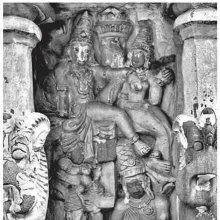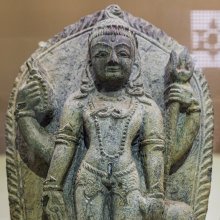Pashupata, Pāśupata, Pāśupatā, Pāśupaṭa: 23 definitions
Introduction:
Pashupata means something in Hinduism, Sanskrit, the history of ancient India, Marathi. If you want to know the exact meaning, history, etymology or English translation of this term then check out the descriptions on this page. Add your comment or reference to a book if you want to contribute to this summary article.
Pashupata has 21 English definitions available.
The Sanskrit terms Pāśupata and Pāśupatā and Pāśupaṭa can be transliterated into English as Pasupata or Pashupata, using the IAST transliteration scheme (?).
Images (photo gallery)
Languages of India and abroad
Sanskrit dictionary
[Deutsch Wörterbuch]
Source: Cologne Digital Sanskrit Dictionaries: Böhtlingk and Roth Grosses Petersburger WörterbuchPāśupata (पाशुपत):—(von paśupati)
1) adj. f. ī gaṇa aśvapatyādi zu [Pāṇini’s acht Bücher 4, 1, 84] [?(vgl. UJJVAL. zu Uṇādisūtra 1, 28).] von Śiva-Paśupati kommend, ihm gehörig, ihn betreffend, ihm geweiht; = paśupatyadhidaivata [Hemacandra’s Anekārthasaṃgraha 4, 120.] [Medinīkoṣa t. 212.] astra [Arjunasamāgama 3, 51.] [Mahābhārata 1, 160. 4800. 3, 1643. 5, 1913. 6, 5802. 7, 2838. 13, 851.] [Harivaṃśa 12737.] [Rāmāyaṇa 1, 56, 6.] [Kathāsaritsāgara 50, 55.] [Madhusūdanasarasvatī’s Prasthānabheda] in [Weber’s Indische Studien 1, 21, 19.] dāna [Mahābhārata 1, 67.] vrata [?12,10470. Pariśiṣṭa des Atharvaveda in Weber’s Verzeichniss 91,8 v. u. Prabodhacandrodaja 79,18. Oxforder Handschriften 75,b,9 v. u.] vrativeśa [Rājataraṅgiṇī 3, 267.] yoga [Oxforder Handschriften 58,b,2 v. u. 50,a,8.] dīkṣā [58,b,3 v. u.] jñāna, śāstra oder n. mit Ergänzung eines dieser beiden Wörter [Mahābhārata 12,13702. 13705.] [Oxforder Handschriften 14,a, Nalopākhyāna 1. 46,a,5.] [Madhusūdanasarasvatī’s Prasthānabheda] in [Weber’s Indische Studien.1,22. 3 v. u. 23,20.] m. ein Verehrer des Śiva-Paśupati [Trikāṇḍaśeṣa 3, 1, 23.] [Medinīkoṣa] [Colebrooke I, 406. fgg.] [KUMĀRILA] bei [MÜLLER, SL. 78.] [Kathāsaritsāgara 34, 69.] [Rājataraṅgiṇī 3, 460. 5, 403.] [Prabodhacandrodaja 21. 1.] [Oxforder II. No. 127.] [Madhusūdanasarasvatī’s Prasthānabheda] in [Weber’s Indische Studien 1, 13, 9.] Inschr. in [Journ. of the Am. Or. S. 6, 507, Śloka 31.] [Hiouen-Thsang I, 41] (pāṃśupata). [124.] [BURNOUF, Intr. 568.] mahā [Oxforder Handschriften 46,a,7. 69,b, Nalopākhyāna 1.] pāśupatopaniṣad [Weber’s Indische Studien 3, 326, 3.] —
2) m. eine best. Pflanze, = vaka, ekāṣṭhīla, śivamallī [Amarakoṣa 2, 4, 2, 62.] [Hemacandra’s Anekārthasaṃgraha] [Medinīkoṣa] —
3) Nomen proprium einer dem Śiva-Paśupati geweihten Localität [Oxforder Handschriften 44,a,5 v. u.]
--- OR ---
Pāśupata (पाशुपत):—
1) śāstra [SARVADARŚANAS. 74, 7. 80, 6. 11.] yoga [74, 8.]
Source: Cologne Digital Sanskrit Dictionaries: Sanskrit-Wörterbuch in kürzerer FassungPāśupata (पाशुपत):——
1) Adj. (f. ī) von Śiva-Paśupati kommend , ihm gehörig , ihn betreffend , ihm geweiht. —
2) m. — a) ein Verehrer des Śiva-Paśupati. — b) *Agati grandiflora. — c) Getonia floribunda [Rājan 10,116.] ; vgl. —
3) n. die Lehre der Pāśupata 2)a). —
4) Nomen proprium einer dem Śiva-Paśupati geweihten Oertlichkeit.
Sanskrit, also spelled संस्कृतम् (saṃskṛtam), is an ancient language of India commonly seen as the grandmother of the Indo-European language family (even English!). Closely allied with Prakrit and Pali, Sanskrit is more exhaustive in both grammar and terms and has the most extensive collection of literature in the world, greatly surpassing its sister-languages Greek and Latin.
See also (Relevant definitions)
Starts with: Pashupata-acarya, Pashupata-rajni, Pashupatabrahmopanishad, Pashupatadhikarana, Pashupatagama, Pashupatajnana, Pashupatalinga, Pashupatamurti, Pashupatarasa, Pashupatashastra, Pashupatastra, Pashupatasutra, Pashupatavrata, Pashupatavratavivarana, Pashupatavratin, Pashupatavrativisha, Pashupatayoga, Pashupatayogaprakarana, Pashupatayogavidhi.
Ends with: Dvaitapashupata, Lakulishapashupata, Mahapashupata, Nakulishapashupata, Shaivapashupata.
Full-text (+566): Pashupatastra, Pashupatavrata, Mahavrati, Pashupatayoga, Pancartha, Mahavratika, Pashupatajnana, Avitatkarana, Drikshakti, Karyakhya, Mahavratin, Pashupatishastra, Shringarana, Pancarthika, Pashutva, Rashikaranabhashya, Mahavrata, Vikramana, Lakulisha, Pashupatavratavivarana.
Relevant text
Search found 73 books and stories containing Pashupata, Pāśupata, Pāśupatā, Pāśupaṭa, Pasupata; (plurals include: Pashupatas, Pāśupatas, Pāśupatās, Pāśupaṭas, Pasupatas). You can also click to the full overview containing English textual excerpts. Below are direct links for the most relevant articles:
The Religion and Philosophy of Tevaram (Thevaram) (by M. A. Dorai Rangaswamy)
The various sects of Shaivism < [Volume 2 - Nampi Arurar and Mythology]
Chapter 2.3 - Partha-anugraha-murti (depiction of the story of Arjuna) < [Volume 2 - Nampi Arurar and Mythology]
Symbology of the sacred thread (Yajnopavita or Pancavata) < [Volume 2 - Nampi Arurar and Mythology]
Lakulisha-Pashupata (Philosophy and Practice) (by Geetika Kaw Kher)
Connection between Lakulisa-Pasupatas and Kapalikas < [Chapter 2 - Spread and Transition]
Evidence of Ajivika cult in Kashmir < [Chapter 2 - Spread and Transition]
The Spread and Transition of Lakulisa-Pasupata Order < [Chapter 2 - Spread and Transition]
Vedic influence on the Sun-worship in the Puranas (by Goswami Mitali)
Part 5 - Semi-Vedic Religious System < [Chapter 3 - General Characteristics of the Purāṇic Religion and its Link with the Vedic Tradition]
A History of Indian Philosophy Volume 5 (by Surendranath Dasgupta)
Part 1 - The Literature and History of Southern Śaivism < [Chapter XXXIV - Literature of Southern Śaivism]
Part 1 - The Doctrine of the Pāśupata-sūtras < [Chapter XXXVIII - Śaiva Philosophy in some of the Important texts]
Part 1 - History and Literature of Vīra-śaivism < [Chapter XXXV - Vīra-śaivism]
Brahma Sutras (Nimbarka commentary) (by Roma Bose)
Brahma-Sūtra 2.2.37 < [Adhikaraṇa 7 - Sūtras 37-41]
Brahma-Sūtra 3.4.48 < [Adhikaraṇa 12 - Sūtras 46-48]
Brahma-Sūtra 3.4.49 < [Adhikaraṇa 13 - Sūtra 49]
The Skanda Purana (by G. V. Tagare)
Chapter 130 - Greatness of Pāśupateśvara (Pāśupata-īśvara) < [Section 1 - Prabhāsa-kṣetra-māhātmya]
Chapter 74 - The Greatness of Oṃkāra (Continued) < [Section 2 - Uttarārdha]
Chapter 43 - Dialogue between Viśvāmitra and Menakā < [Section 1 - Tīrtha-māhātmya]
Related products



